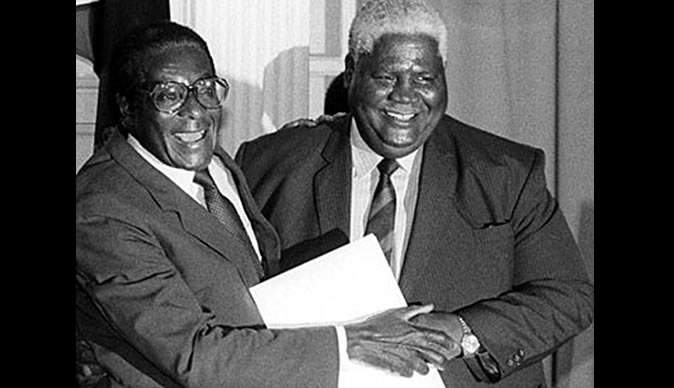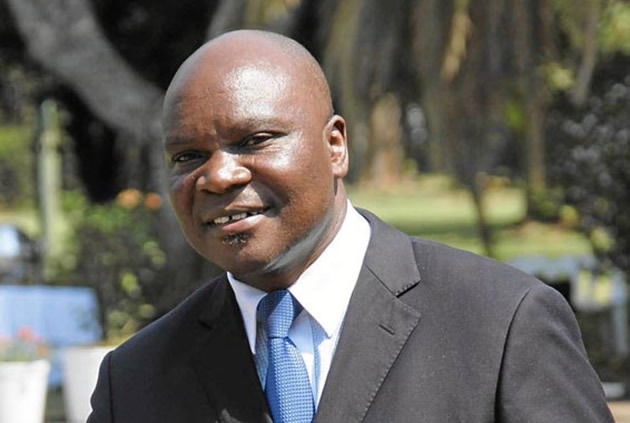EDITORIAL COMMENT: Let’s cherish the unity and peace prevailing in our country

Today Zimbabweans from all walks of life mark the 29th anniversary of the signing of the Unity Accord.
The past 29 years have been characterised by national peace and unity, which are key preconditions for development. We look back with much pride on the achievements that we have scored as a nation, at the same time looking to the future with hope for greater unity and development.
On December 22, 1987, President Mugabe, representing Zanu-PF and Dr Joshua Nkomo, representing PF-Zapu signed the Unity Accord to end the civil disturbances that had ravaged some parts of Matabeleland region and the Midlands.
Our leaders showed a great deal of maturity and selflessness by setting aside parochial ambitions for the national interest. We hail them for that.
No country has progressed in an environment where neighbour rises against neighbour, brother rises against brother and tribe rises against tribe.
All efforts would be concentrated on how one can outdo the other, how one can injure the other where it hurts the worst while more important matters — building education facilities, factories, infrastructure, health facilities, relationships and so on — stagnate.
There are many examples on the continent where disunity and insecurity have precipitated much human suffering and economic regression. With respect, we don’t think that a country like the DRC, given the mind-blowing mineral wealth and favourable climate it is endowed with, is where it should have been if there was peace over the past decades. We don’t think Somalia would be where it is today if it had known peace for a longer time. Nearer home, Mozambique would have been more developed if it had not lost 17 years due to the civil war. In that connection, we are saddened by the resurgence of fighting in that country.
These are key case studies that demonstrate that peace and national unity are important in advancing the socio-economic conditions of nations.
It is pleasing that our leaders realised that their country would not go anywhere if the divisions and fighting of the early 1980s were allowed to persist.
That the national literacy rate is the highest in Africa at 92 percent is because the Government and its partners were able to build schools across the country and deploy teachers and the people are free to access the services provided at the institutions. If the instability had continued we would not have attained that record. From the foundation of the high literacy rate, the Government has been able to build training institutions like colleges and universities where thousands receive education in various skills. Graduates from these institutions are serving their country while others are working abroad where they have restated the reputation that our education system has.
The Government has made advances in providing health services to the people. It has built clinics, hospitals and equipped them. This would not have been achieved if the nation had remained at war with itself. A number of national economic programmes have been implemented over the years to lift the people out of poverty.
The land reform and redistribution programme of the past 16 years is key among them. All the provinces have been covered under the initiative and indigenous blacks — regardless of their tribe and place of origin have benefited. There are thousands of people who were born in one province, but were allocated land in a far-away province, evidence of the national character of the land redistribution agenda. An environment where disunity, tribalism and regionalism reigned would have frustrated this important national programme.
The indigenisation and economic empowerment programme is meant to integrate indigenous blacks into the mainstream economy. The basic requirement for one to benefit under the programme is for one to be an indigenous Zimbabwean. We don’t think a people who are fighting among themselves would prosecute such national initiatives the way we are doing.
One of the greatest dividends of the prevailing peace and unity is actually the freedom that the people of this nation are enjoying. Freedom of movement is often curtailed in times of civil strife. The same applies to other freedoms — of association, assembly and to pursue social, political and economic opportunities. Zimbabweans are free to move, at any time, to whatever place in their country without the fear of encountering the fighting that used to occur between 1982 and 1987. They are free to associate across tribes, even marrying into any of them as long as they find love.
They are free to congregate anywhere without the fear of being bombed by government troops or some armed gang. This, of course, is subject to the normal provisions of relevant laws. They are free to seek jobs, political office or to set up businesses anywhere in their country.
We stand corrected, but we don’t think it was that easy to move, associate, assemble, and seek political office and economic opportunities during the civil disturbances in parts of Matabeleland and Midlands.
That is why we cherish December 22 and expect all Zimbabweans to do likewise.
But we would be honest to note that the country is facing a number of challenges that must be overcome for greater enjoyment of peace and unity.
The biggest of them is obviously the difficult economic conditions and their downstream impacts. Many companies are closing or downsizing, resulting in job losses. Investment inflows remain subdued. Because of economic constraints, the Government’s capacity to deliver social services is hampered.
Corruption has become a sore headache. It manifests itself at low levels where a municipal police officer demands and receives a bribe from a street vendor to high levels where senior government officials, including one or two ministers, have corruptly enriched themselves and their cronies using public resources, money that could have been better spent paying school fees to orphans or their social grants. It manifests itself in the private sector as well where hundreds of millions change hands in shady deals. The cost to the economy is massive.











Comments